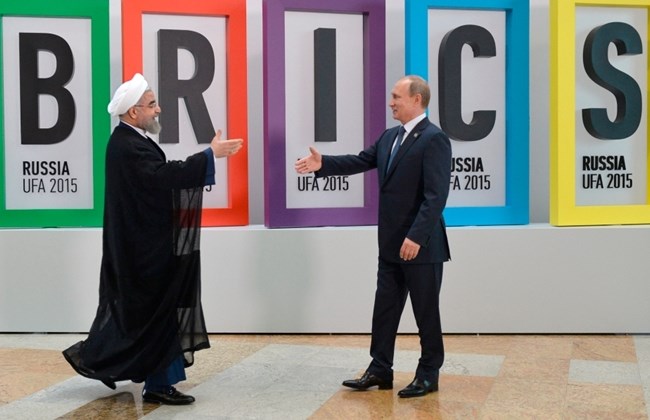Putin’s latest land-grab is in Syria
Dr. Azeem Ibrahim/Al Arabiya/September 14/15/
The regime of Syrian President Bashar al-Assad had been getting weaker over the summer, and we were on the cusp of a profound reorganization of the balance of power in the Levant. The regime had suffered serious losses, both in terms of battles and key strategic holdings, both to ISIS in the east and central Syria, and to Western-backed rebel groups in the south and the north-west. Analysts had pointed out that the regime’s strategy shifted from trying to keep hold of all territory, towards retreating and consolidating in its key Alawite heartlands, on the Western strip of the country which includes Damascus, Homs and Hama.I have written before that this set the scene for Russian involvement on the ground in Syria. And sure enough, the evidence now suggests that Russian personnel is embedded in most levels of the Syrian war effort. And the evidence also shows that Russia is coordinating with Iran in its Syria policy: Major General Qasem Soleimani of the Islamic Revolutionary Guards’ ‘Quds Force’, the supreme commander of Iran’s war against ISIS, reportedly flew to Moscow to speak with the Russians just weeks after Iran signed the nuclear deal with the Western powers.
If Russia is seen to engage directly to aid the Assad government, it is highly unlikely that Syrian rebel forces could be persuaded to come back to the negotiating table.
What chance of negotiation? Russian President Vladimir Putin had been keen to portray himself as a mediator in the conflict, certainly between the Assad regime on the one side and the Western-backed rebels on the other. But if Russia is seen to engage directly to aid the Assad government like this, it is highly unlikely that Syrian rebel forces could be persuaded to come back to the negotiating table – not unless the Russian intervention leads to a dramatic reversal of the situation on the field. The die is now cast, however. The evidence of Russian involvement is even clearer than the evidence for their involvement in east Ukraine. And Putin has also been a lot less circumspect about the role he is now playing, and intends to play in the future, in the conflict. Of course, this is a hugely risky enterprise for Putin. Even Russians remember that a protracted, seemingly endless conflict against radical Islamism in Afghanistan eventually contributed to the collapse of the Soviet Union, and also Islamist insurrections in Chechnya later in the 90s. Even if history will not repeat itself, surely there will be at least some on the home front who are now questioning Putin’s judgement. So Putin is taking a personal risk here as well.
Putin’s land grab
But he must be thinking that the risk is worth taking. And the main reason to think so is the calculation that now Russia will have locked the West out of the conflict in Syria – at least as far as fighting the Assad regime goes. Does the U.S., or indeed do any of their European allies, really want to take the risk of direct military engagement with Russian troops in Syria? Does anyone have the stomach to risk that kind of escalation in this new cold war we are witnessing? Putin has made another land grab, and has put the Western allies in a position where they cannot themselves respond without risking escalating the conflict.
No doubt, Russia will be keen to underplay the extent of its involvement. And it will claim that it is on the ground simply to help combat terrorism. But one way or the other, Putin has made another land grab, and has put the Western allies in a position where they cannot themselves respond without risking escalating the conflict to levels they are not committed to undertake. Just as he has done in Crimea, and in East Ukraine. What the fallout from this will be is yet unclear.
But some contours are already shaping up. The Assad regime will be sustained, in some form. Russia will seek to put it in the strongest possible position before any negotiations for a settlement will even be considered. The West is left scrambling for a strategy, trying to balance the unholy mess of “allies” it has in the region, between the rebels it is arming and funding, the Kurds, the Turks, and the neighbouring Sunni states of Jordan and Saudi Arabia. It is not clear what their negotiation position will eventually be, but whatever hope there was that the indigenous militants they are training might one day take over the Syrian government has been decisively dashed. And Iran looks set to happily walk into the power-vacuum and consolidate for an eventual onslaught against ISIS. But the region remains a tinderbox, and one can never know when a stray shot will cause the current alignment of alliances to unravel and blow the whole region up once more.
Russia aims to restore its Mideast prestige after U.S. ‘creative chaos’
Raghida Dergham/Al Arabiya/September 14/15
Russian diplomacy aims to settle conflicts in the Middle East and North Africa, and has a roadmap for specific measures to contain terrorism in the region, for which it is seeking international blessing and a mandate from the U.N. Security Council to lead on these issues. The time of rivalry between Moscow and Washington, over who leads in the Middle East, is over. At one point, the two countries came together to jointly sponsor the Middle East peace process, and later established the Quartet, which also included the U.N. and the EU in addition to the United States and Russia. The Quartet, however, proved to be little more than an empty façade.






















